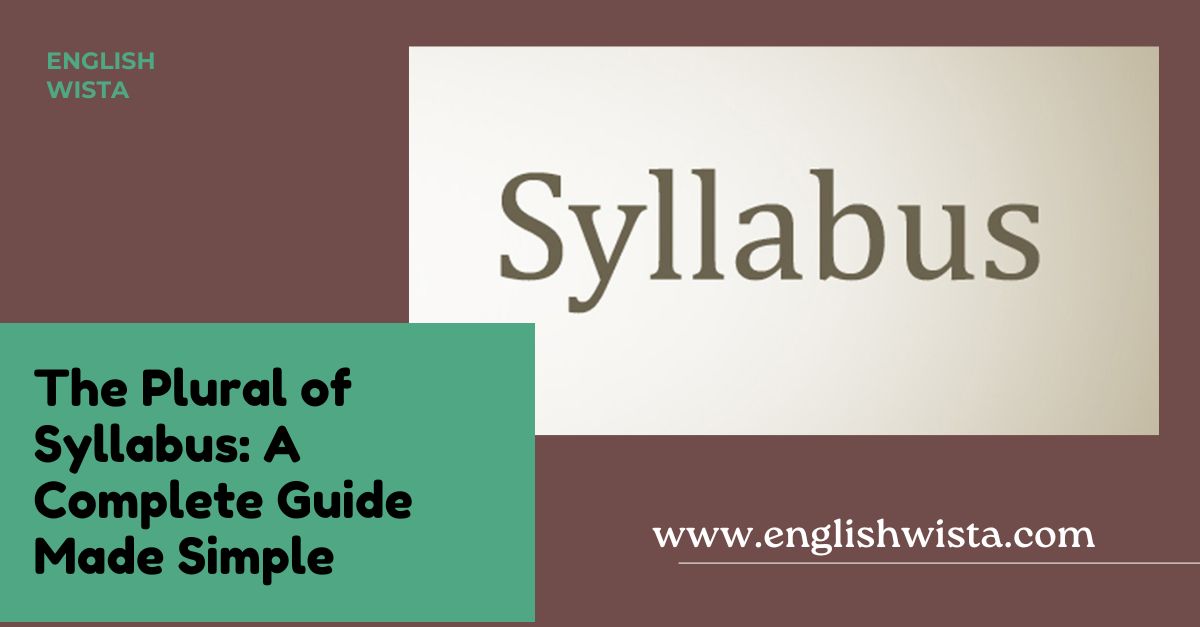Have you ever stared at the word syllabus and wondered how to make it plural? You’re not alone! Many people, including native English speakers, pause when they need to write or say the plural form of this word. Is it syllabuses? Or maybe syllabi? Both versions exist, and that’s where confusion begins.
In this article, we’ll clear up the mystery. Together, we’ll explore the plural of syllabus, look at its origins, and see plenty of real-life examples. Don’t worry we’ll keep things simple, clear, and friendly. Think of this as a chat with a friend who just happens to love words.
Let’s dive in and finally settle the question: what’s the plural of syllabus?
What Does Syllabus Mean?
Before we jump into plurals, let’s take a moment to understand what syllabus actually means.
A syllabus is a summary or outline of the main points in a course of study. Teachers and professors usually give a syllabus at the start of a semester or class. It lists what will be taught, important dates, reading assignments, grading policies, and other useful details.
Simple definition:
A syllabus is a document that tells students what a class will cover.
Example:
- “The professor handed out the syllabus on the first day of class.”
- “The syllabus included the exam dates and required readings.”
So now that we know what a syllabus is, how do we talk about more than one?
What Is the Plural of Syllabus?
Here’s the answer: both syllabuses and syllabi are correct plurals of syllabus.
Yes, you read that right. You can say syllabuses or syllabi, and both will be understood.
- Syllabuses is the standard English plural, formed by simply adding -es.
- Syllabi comes from Latin, the language where the word originally came from.
Which One Should You Use: Syllabuses or Syllabi?
You might be wondering: if both are correct, which is better to use?
The short answer: syllabuses is more common in everyday English.
Why? Because English usually forms plurals by adding -s or -es. For example:
- bus → buses
- bonus → bonuses
- status → statuses
By following this regular pattern, we get syllabus → syllabuses.
However, some people, especially in academic settings, prefer to use syllabi. It sounds a bit more formal and scholarly, because of its Latin roots.
So:
- In casual or everyday conversation, syllabuses is perfectly fine.
- In formal or academic writing, you may see syllabi more often.
Both are correct, and it depends on your audience and style.
Why Do We Have Two Plural Forms?
Good question! To answer it, let’s take a quick trip into history.
The word syllabus comes from Latin, where many words ended with -us. In Latin, the plural of such words often changed to -i. For example:
- alumnus → alumni
- stimulus → stimuli
- cactus → cacti
So, when syllabus was borrowed into English, some people kept the Latin style plural (syllabi). Others followed the normal English way of adding -es (syllabuses). Over time, both versions became accepted.
Fun fact: Some scholars say that syllabus was actually a mistake! It may have come from a misreading of the Latin word sittybas, which meant “title” or “label.” But once the mistake entered English, it stuck and now it’s the word we all use.
Is Syllabus Singular or Plural?
This one’s easy: syllabus is singular. It refers to one course outline.
Examples:
- “This syllabus is too long!”
- “I lost my math syllabus.”
If you’re talking about more than one, you’ll need syllabuses or syllabi.
Example Sentences with Syllabuses and Syllabi
To make things clearer, let’s look at both plurals in real sentences.
Using Syllabuses:
- “The students compared their syllabuses to see which classes looked harder.”
- “All the course syllabuses are available on the school’s website.”
- “Different teachers write their syllabuses in different styles.”
Using Syllabi:
- “The professor kept old syllabi from every class he had taught.”
- “University syllabi often include rules about plagiarism.”
- “The syllabi for the language courses were updated last year.”
Notice how both versions work. If you replace one with the other, the sentence still makes sense.
Comparing with Other Similar Words
- Syllabus* isn’t the only word that has two plural forms. Let’s look at a few others:
- Cactus → cactuses / cacti
- Octopus → octopuses / octopi
- Focus → focuses / foci
In each case, the “regular” English plural and the “Latin-style” plural are both accepted. This helps us see why syllabuses and syllabi both exist.
When to Use Each Form in Writing
If you’re writing an essay, an email, or an academic paper, how do you decide which form to use?
Here are some tips:
- For general use: Stick with syllabuses. It’s straightforward, modern, and easy to understand.
- For formal or academic writing: You may choose syllabi if you want to sound more traditional or scholarly.
- For consistency: Pick one form and use it throughout your document. Switching back and forth might confuse your readers.
Common Mistakes to Avoid
Because syllabus can feel tricky, people sometimes make mistakes. Here are a few to watch out for:
- Don’t say “syllabuss.” The correct forms are syllabus (singular) and syllabuses or syllabi (plural).
- Don’t confuse with “syllables.” A syllable is a unit of sound in a word (like “cat” has one syllable, “banana” has three). That’s a totally different word!
- Don’t mix the plurals. Avoid writing “syllabuses/syllabi” in the same sentence unless you’re explaining the difference.
Fun Facts About Syllabus
To keep things interesting, here are some fun nuggets about the word syllabus:
- The earliest known use of the word in English was in the 1600s.
- Some universities actually publish their old syllabuses (or syllabi) in online archives for history lovers.
- In everyday conversation, some teachers casually say “course outline” instead of “syllabus,” especially with younger students.
Quick Recap
Let’s summarize what we’ve learned in simple points:
- Syllabus is singular.
- The plural can be either syllabuses (regular English form) or syllabi (Latin-style form).
- Syllabuses is more common in everyday English.
- Syllabi is sometimes used in formal or academic contexts.
- Both are correct choose the one that fits your style and audience.
Conclusion
So, what’s the plural of syllabus? Now you know the answer: it can be either syllabuses or syllabi. Both are correct, and you won’t go wrong with either one.
When in doubt, go with syllabuses it’s simple, clear, and widely used. But if you’re feeling fancy or working in an academic setting, syllabi can give your writing a more scholarly tone.
The best part? Now you won’t hesitate the next time you’re writing about multiple course outlines. Whether you choose syllabuses or syllabi, you’ll be correct.
Next time someone asks, you’ll be ready with a confident answer. And that’s the power of understanding the plural of syllabus!



